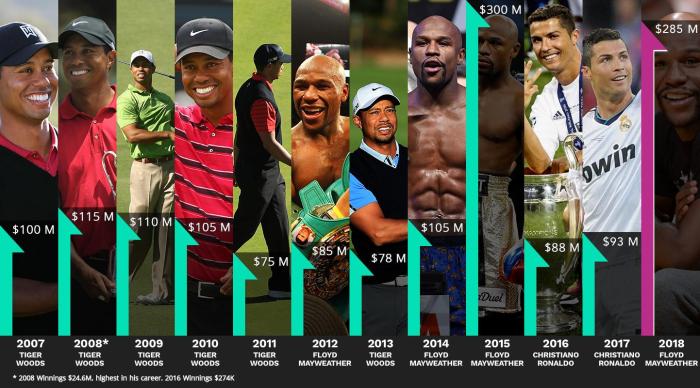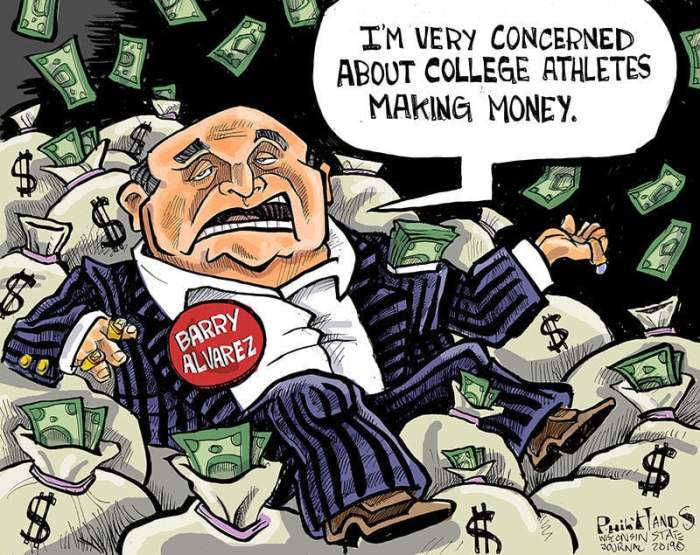Do athletes deserve their high salaries – In the realm of professional sports, the topic of athlete salaries has sparked intense debate. Do athletes deserve the exorbitant compensation they receive? This essay delves into the multifaceted nature of this issue, examining the economic, social, and ethical implications of high athlete salaries.
From the staggering sums paid to star athletes to the potential impact on youth sports participation, this analysis provides a comprehensive overview of the topic, offering insights into the factors that influence athlete salaries and the broader consequences they entail.
Athlete Salary Structure: Do Athletes Deserve Their High Salaries

Athlete salaries comprise various components, including base pay, performance bonuses, endorsement deals, and other forms of compensation. Base pay, guaranteed regardless of team or individual performance, forms the foundation of an athlete’s salary. Bonuses reward exceptional team or individual achievements, such as winning championships or setting records.
Endorsements involve athletes promoting products or services for payment, supplementing their base income. Additional forms of compensation may include signing bonuses, trade bonuses, and appearance fees.
Factors influencing athlete salaries include team performance, individual performance, and market demand. Strong team performance can lead to higher salaries for all team members, while exceptional individual performance can command premium salaries. Market demand, driven by factors such as fan interest and media exposure, can also significantly impact athlete salaries.
Economic Impact of Athlete Salaries
Athlete salaries have a substantial impact on the sports industry. Team revenue, generated from ticket sales, merchandise, and broadcasting rights, is directly affected by athlete salaries. Higher salaries attract top talent, leading to improved team performance and increased fan engagement.
League revenue, distributed among all teams, is also influenced by athlete salaries, as high-profile athletes draw larger audiences and generate more revenue for the league.
Beyond revenue, athlete salaries can stimulate economic growth through job creation and increased tourism. The construction and operation of sports facilities, the production and sale of merchandise, and the hospitality industry all benefit from high athlete salaries.
Social Impact of Athlete Salaries, Do athletes deserve their high salaries
High athlete salaries raise social implications, including income inequality and the impact on youth sports participation. Income inequality may arise when athlete salaries far exceed those of other professionals, leading to concerns about fairness and social cohesion. Additionally, high athlete salaries may discourage youth sports participation if they create unrealistic expectations or suggest that only the most talented individuals can achieve financial success in sports.
However, athletes also serve as role models, inspiring young people to pursue their dreams and lead healthy, active lives. Their salaries can demonstrate the value of hard work and dedication, encouraging youth to strive for excellence in all areas.
Ethical Considerations
The ethics of high athlete salaries are complex. While athletes provide entertainment and generate revenue, the value of their labor and the social responsibility of professional sports teams must be considered. Exploitation or unfair treatment of athletes, such as excessive training regimens or limited opportunities for education, raise ethical concerns.
Furthermore, the allocation of resources in professional sports, with high salaries concentrated among a small number of athletes, may raise questions about the distribution of wealth and the priorities of society.
Historical Perspective
Athlete salaries have undergone significant evolution over time. In the early days of professional sports, salaries were relatively modest, with athletes often working additional jobs to supplement their income. However, as sports gained popularity and commercialization increased, athlete salaries began to rise rapidly.
Factors contributing to the increase in athlete salaries include the rise of television and broadcasting rights, the expansion of professional sports leagues, and the increasing demand for top talent. Collective bargaining agreements between athletes and team owners have also played a significant role in shaping athlete salaries.
Comparative Analysis
Athlete salaries vary widely across different sports, leagues, and countries. Factors such as the popularity of the sport, the size of the league, and the economic conditions of the region influence salary levels.
In general, athletes in major professional sports leagues, such as the NFL, NBA, and MLB, command the highest salaries. Within these leagues, top players and star performers earn significantly more than their counterparts. Salary disparities also exist between different sports, with athletes in some sports, such as soccer and basketball, earning higher salaries than those in other sports, such as baseball and hockey.
Q&A
Are athlete salaries too high?
The level of athlete salaries is a matter of ongoing debate, with some arguing that they are excessive while others maintain that they are commensurate with the value and entertainment they provide.
What are the economic benefits of high athlete salaries?
High athlete salaries can contribute to job creation, increased tourism, and economic growth in the surrounding communities of sports teams.
What are the social implications of high athlete salaries?
High athlete salaries can have both positive and negative social implications, including the potential for income inequality and the impact on youth sports participation.
Are there ethical concerns associated with high athlete salaries?
Ethical concerns related to high athlete salaries include the potential for exploitation or unfair treatment of athletes, as well as the social responsibility of professional sports teams.


